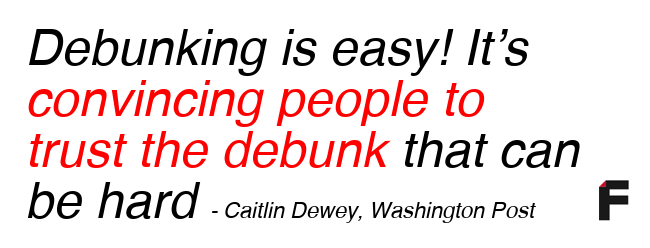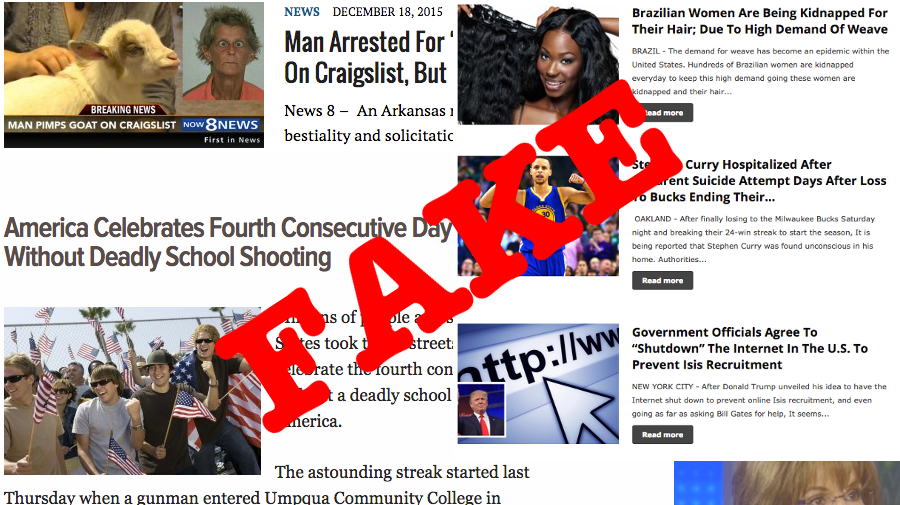After 82 weeks of debunking hoaxes with her “What Was Fake On the Internet This Week” column, Caitlin Dewey of the The Washington Post announced that the latest column will be the last.
The reason? “The people who fall for hoax news stories are frequently only interested in consuming information that conforms with their views — even when it’s demonstrably fake,” she wrote.
It’s incredibly hard to get people to change their views. Even when you debunk a falsehood, many people will simply ignore it if it contradicts with their beliefs.
I spoke to Dewey about why the column was ending, and whether we should spend time debunking even when at least some people will be unaffected.
Remind us why you started the column in the first place.
We (my editor and I) originally started the column because there was an epidemic of hoaxes, pranks and fake news in the spring of 2014. I was writing several separate posts a week debunking individual stories, and it seemed more efficient to glom them together in a weekly column.
When you started doing it, did you expect to last this long, or to go longer?
I don’t think I came into it with any particular expectations – I just thought we’d do it for as long as it seemed like a useful resource.
How has traffic for the final column been compared to other editions of it?
The traffic to the final column has been much higher than is average. Which was surprising, honestly! I know that column has a pretty devoted fanbase that checks it every week, but I didn’t expect anyone to much care outside that circle.
Should other people continue to do this work, or do you overall think it’s doomed due to the research you cite and the above-mentioned challenge?
Yes! People should absolutely keep doing this work. I read Snopes every day. They are heroic. I don’t want to suggest that anyone should throw in the towel on this, because it’s obviously a principle function of journalism to correct misinformation. Personally, however, I’m interested in looking for ways to do that outside the limited template of a weekly column. That’s going to be a great challenge.

You write in the last column that “the nature of Internet misinformation has changed”. What changed?
A lot has changed. For one thing, hoax news has become industrialized on a scale that it never was before. There are dozens of websites, most less than 18 months old, that exist only to propagate real-looking fake news stories.
On top of that, as I say in the column, it feels like the tenor of fake news has changed. Where once these hoax stories were merely sensational or ridiculous – like your standard clickbait, basically – many now exist to exploit preconceived notions and biases. (Needless to say, that’s not a development that’s confined to fake-news sites or Internet hoaxers, either – it’s a problem we see across a wide swath of Internet media.)
One thing I’ve experienced doing debunking work is a sense of frustration and feelings of futility, due to the fact that the fake stuff would often get much more social traction and traffic.
Is that also a factor for you in stopping the column?
I definitely feel a sense of frustration/futility, but I wouldn’t say that it’s traffic-related. The traffic to the column has generally been pretty good. And I understand that’s kind of the nature of the beast – of course the sexy lie is going to get more attention than the very unsexy debunking.
For me, what has become far more frustrating is a certain unwillingness to believe the debunk. I would see readers share links to the column on Facebook, telling their friends that a story or rumor they had posted wasn’t true. And the friends would come back with something like “you trust the Washington Post, that liberal rag???!?!?” It’s like a total unwillingness to engage with actual evidence.
What’s the most creative/best executed hoax you wrote about, and why?
Thank you for giving me this opportunity to note that not all hoaxes are soul-crushing. I mean, the Internet does have a longgg history of prankery and trolling and shenanigans and some of those jokes are legitimately very clever and funny. It’s always great, for instance, when teenagers troll us olds by tweeting en masse that they don’t know who Paul McCartney is or something similarly rage-inducing. That’s a malice-free fake, and I can appreciate it.
Which one made you fear for humanity?
Honestly, there are very few that don’t make me fear for humanity. But I would say some of the more evolved, entrenched conspiracy theories have been particularly mind-boggling to me – things like Jade Helm or Sandy Hook truthers. I mean, these people have constructed a truly nightmarish fantasyland for themselves. How do we address that? How do we continue to dialogue with them? I have not the slightest idea how to answer those questions, but I feel like it’s probably not a weekly column.
Aside from clicking on the “About/Disclosures” link on a website, what other tips do you have for would-be debunkers?
So much of debunking is actually Googling, right? Google the name of the writer and the people named in the story. Run a reverse-image search on any pictures. Check if any local outlets have reported on it. Search the URL on Twitter and Facebook and see what people are saying about it. If the story involves a crime, call the local PD. If the story names an actual real person, friend them on Facebook and ask what happened. Debunking is easy! It’s convincing people to trust the debunk that can be hard.



